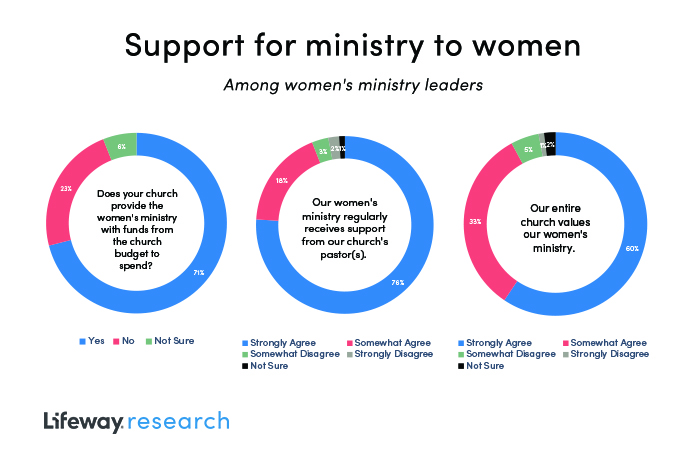
Women’s ministry leaders should know their value and feel our support so we can pierce the darkness with the light of the gospel. Together.
By J.D. Greear and Lesley Hildreth
On any given Sunday, in nearly every church in the United States, more than half the people in attendance are women. And on volunteer or serving teams in some churches, the percentage is even higher. It’s frightening to think of what would happen to the church in America if women suddenly decided to opt out of ministry. And we don’t just mean women’s ministry—all ministry.
But when we talk to women in ministry, we often hear similar themes—exhaustion and isolation. There’s no getting around it: Ministry can wear you down. But it wears you down much faster if you aren’t getting the support you need.
“It’s frightening to think of what would happen to the church in America if women suddenly decided to opt out of ministry.” — @jdgreear, @LesleyHildreth Click To TweetBecause every Christian woman is called by God to engage in God’s mission, we believe the church should equip every woman for the task. And pastors have a unique opportunity to help lighten the load.
The question is: How?
To be clear, we don’t know any pastors who are trying to exhaust the women in their ministries. Most pastors we hear from eagerly want to support the women in their churches. But they also acknowledge a gap. It’s the gap between their aspirations and their lived reality. Sadly, many women end up falling into that gap, leading to frustration, isolation, bitterness, and burnout.
You can close the gap. And you don’t have to overhaul your entire ministry philosophy to do so. It simply takes a healthy dose of intentionality and creativity. And the State of Ministry to Women report from Lifeway Research gives us some insights.
Here are three ways you can support the women doing ministry in your church:
1. Communicate their value
The primary identity of any woman in your church has nothing to do with her ministry. Before she is a ministry leader, she is a daughter and a sister—a daughter of God and a sister in Christ. It’s difficult to overstate how important this is. As daughters of God and sisters in Christ, women are of incalculable value. You already believe this. Now your job is to make it known, to make it felt.
If your church is large enough to hire women for ministry positions, this is a great way to communicate their value. And we show their value when we don’t merely hire a few women for menial tasks but hire qualified women to have a formative voice in the direction of the church, helping in the shared mission God has entrusted to all of us.

But your church may not be doing this yet. In fact, the State of Ministry to Women found 83% of those responsible for ministry to women in the church are volunteers or unpaid staff members. If that’s your church, here are two tangible things you can do (no matter your church’s size) today:
First, make a plan.
Have a plan in place for when and how you compensate various women’s ministry leaders. You won’t be able to hire everyone. That’s okay. But don’t let that lead you to hire no one. Make this a priority by mapping out clear benchmarks, creating a timeline, and assessing what’s possible given your annual budget. Then, stick to your plan. This may take time, but over the long haul, it will communicate value and build trust.
Second, make sure your women’s ministry volunteer has what she needs.
You may not be able to hire every volunteer full time. But equip them with everything else you can: Give them an official title; write up a job description. The State of Ministry to Women found only 5% of women’s ministry leaders plan together with the church staff. Give them opportunities to collaborate with staff and church leaders; share your resources.
Remember: Money is not the only way we show value or appreciation. For example, you can show appreciation by publicly recognizing a job well done or by having a volunteer serve in a visible role during the weekend service to ensure others are aware of her leadership position. You also communicate value when you give her a seat at the table when decisions are made about ministries of the church.
2. Partner with them
Most women we’ve talked to—whether volunteer or paid—have expressed a desire to have more support from their pastor or church leadership. This is nearly always a surprise to the pastor, who assumes he is supporting her. But pastors tend to think of support in terms of permission (You’ve got authority to execute this ministry), while most women in ministry think of support in terms of partnership (We’re laboring toward a shared vision, together).

Permission is great. But permission is not a partnership.
“Pastors tend to think of support as permission (You’ve got authority to execute this), while most women in ministry think of support as partnership (We’re laboring toward a shared vision, together).” — @jdgreear, @LesleyHildreth Click To TweetAlso in the State of Ministry to Women study, 2 in 5 (40%) women’s ministry leaders expressed their own need for development in vision and direction. This means women are struggling to see the connection between their ministry and the church’s ministry. The more pastors can partner with women, showing how their ministry integrates into the life of the whole church, the better.
For example, our church’s mission statement is, “Following the Holy Spirit, we exist to create a movement of disciple-making disciples, in Raleigh-Durham and around the world.” With this in mind, my (Lesley’s) title is not women’s ministry director—though there’s nothing wrong with that title—but women’s discipleship director. What we do in women’s ministry at the Summit weaves seamlessly into our core mission.
What might this look like for you? You don’t need to rename all your women’s ministry leader titles—at least, not necessarily. But connect with the women in your ministry to make sure they know how what they do connects to the whole. Make sure they know they aren’t given just permission but true partnership in the church.
3. Develop them
Everyone in ministry needs training if they’re going to keep growing and help others grow. Many pastors, unfortunately, aren’t sure how to train their women’s ministry leaders. And unsure of the best method, they choose no method. Although most women’s ministry leaders have some level of training, the State of Ministry to Women study found 13% of women’s ministry leaders have not received any training.
Development in ministry is a non-negotiable. Don’t be so sheepish about doing it wrong that you don’t do it at all.
You might begin by thinking about ways your church is already providing development for other groups—for your staff, your elders, your deacons, your lay leaders. Is there anything there that you could reproduce? You could invite them to participate in cohorts you’re already leading. You could begin mentoring relationships. Or you could read books together or attend conferences together.
And it doesn’t all have to land on you. Perhaps your plate is already full. (Isn’t it always?) If that’s the case, do some connecting. Find other leaders in your church who have the margin to mentor a women’s ministry leader. Delegating isn’t cheating; it’s exercising wisdom.
It is not good to be alone
As daughters of God and sisters in Christ, women bear the honor and responsibility of sharing in the Great Commission.
“As daughters of God and sisters in Christ, women bear the honor and responsibility of sharing in the Great Commission.” — @jdgreear, @LesleyHildreth Click To TweetAs women exercise their gifts, they should be visible to your congregation.
Women should have a multitude of leadership pathways open before them—both through volunteer positions and (if possible) through paid staff positions—in which they can develop their gifts and grow.
They should be given a formative voice in the direction of the church, helping in the shared mission that God has entrusted you with.
Above all, they should know they aren’t doing this work alone.
Our prayer is that the women in your church would know their value and feel your support, so you can pierce the darkness with the light of the gospel. Together.
For permission to republish this article, contact Marissa Postell Sullivan.

J.D. Greear
J.D. is the pastor of The Summit Church, in the Raleigh-Durham area of North Carolina. He’s the author of several books, including What Are You Going to Do with Your Life?

Lesley Hildreth
The Summit Church in the Raleigh-Durham area of North Carolina.












